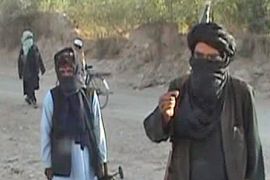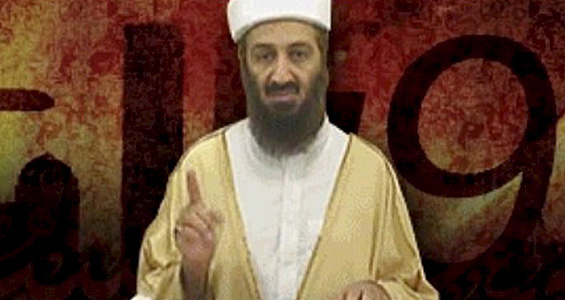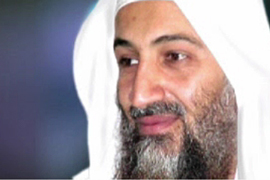‘Al-Qaeda facilitates insurgency’
Bin Laden’s ideology strengthens anti-government groups, say Afghan officials.

 |
| Bin Laden’s fate is unclear but analysts say the al-Qaeda leader continues to inspire fighters [EPA] |
Tucked deep in the Tora Bora mountains in eastern Afghanistan lies one of Osama bin Laden’s defunct military bases.
The base was home to the al-Qaeda leader before it was destroyed during the US-led bombing of Afghanistan in 2001.
Locals still remember the man who was a guest of the Taliban regime. “He was a simple guy just like us … he never disturbed anyone. He was unique,” says resident Hajji Tutti.
Baz Ghul, another local, recalls: “Every time we came to visit, he treated us well and greeted us with both hands. When the bombing started, he disappeared and we never saw him again.”
For years there have been contradictory reports on bin Laden’s whereabouts – and even whether he is dead or alive.
While bin Laden’s fate remains unknown, the question of how strong al-Qaeda is eight years on is at the heart of the current debate over whether to send additional US troops to Afghanistan.
US security fears
| in depth | |||||||||||||||
|
The US describes the war in Afghanistan as a “war of necessity”, and stresses that defeating al-Qaeda and the Taliban is crucial for US national security.
That is how the White House is selling the war to the American people as it reviews its war strategy.
Barack Obama, the US president, believes there is a huge risk al-Qaeda will once again find safe haven in Afghanistan – an assessment government officials here agree with.
“The terrorists operating in Afghanistan are a branch of international terrorism,” says Rangin Dadfar Spanta, the Afghan foreign minister.
Spanta believes the country is a victim of global extremism, denying that the current increase in violence is a domestic insurgency.
The foreign minister has also warned against any withdrawal of foreign forces from the country, describing such a move as “unacceptable for Afghanistan”.
The US invaded the country in 2001 in order to capture or kill bin Laden, and deny al-Qaeda sanctuary. Eight years later, that mission remains unaccomplished.
Some analysts believe that not only has Washington failed to curb al-Qaeda’s influence, but the presence of US troops in Afghanistan has simply served to export al-Qaeda ideology to other groups – including the Pakistan Taliban.
“We have not only been unable to defeat al-Qaeda … [but] we have taken them from Afghanistan to the FATA area [Pakistan’s northern tribal areas) where their key leadership resides and now have a serious role in Afghanistan,” says Hekmat Karzai, a regional security analyst.
Al-Qaeda message
Afghan officials believe that it is the spread of al-Qaeda’s ideology – which brands the US so-called “war on terror” as a de facto “war on Islam” – which has strengthened and legitimised the Taliban.
General Abdel Meneem Farahie, head of the anti-terrorism unit in the Afghan interior ministry, believes there would have been more of a chance to effectively destroy al-Qaeda and its ideology had bin Laden had been arrested or killed in 2001.
|
“Bin Laden makes a huge difference… he constantly inspires people and, in my opinion, [he] is still in control of a broad ideological movement” Hekmat Karzai, Afghan security analyst |
“But today the situation has changed, and… al-Qaeda has recruited a new young generation [of supporters] and they have close links with bin Laden,” he says.
It is bin Laden’s message, many say, that lure members to the group. He draws on the feeling of “injustice” that many in the Muslim world feel.
“As a whole, bin Laden makes a huge difference – in terms of where the movement is,” Karzai says. “He constantly inspires people and, in my opinion, [he] is still in control of a broad ideological movement.”
In addition to providing a new generation of fighters with an ideology, and the figure of bin Laden to rally around, al-Qaeda is also believed to bankroll and facilitate “operations”.
“Afghanistan doesn’t face a monolithic insurgency. There are many groups operating in the country and al-Qaeda serves a facilitating role,” Karzai says.
“The network is able to provide technical assistance and resources, like bringing fighters for them. Also the leader of al-Qaeda in Afghanistan is a competent guy called Mustafa Yazid, who is Egyptian … he is not really a fighter but a facilitator.”
US strategy
 |
| Young fighters are drawn by al-Qaeda’s belief the US is waging a de facto “war on Islam” |
The government says they often arrest foreign fighters crossing from Pakistan where, Afghan officials believe, al-Qaeda and the Taliban operate and bin Laden continues to inspire.
But Robert Fisk, a journalist who has interviewed bin Laden more than once, believes the al-Qaeda leader is no longer relevant.
“Having created al-Qaeda, I don’t think bin Laden matters. It is like you have an atom bomb and then you arrest all the nuclear scientists. It won’t make a difference… the atom bomb is born and we live with the monster and al-Qaeda exists,” he says.
The US may be making some progress in Afghanistan but the composition of the enemy and the nature of the battle has changed.
Analysts say that to win this war, the US will have to modify its approach and enforce its position that it – and the West – is not in direct conflict with Islam – an idea that has allowed al-Qaeda and other groups to recruit fighters and sympathisers.
